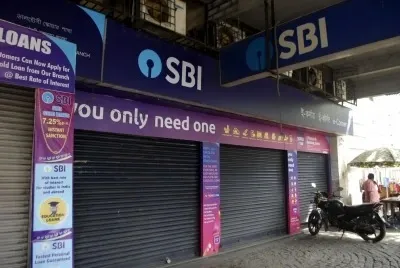Why Were Government Banks Closed Across Rajasthan Today as 11,000 Employees Join Nationwide Strike?

Synopsis
Key Takeaways
- Rajasthan government banks closed due to a strike.
- Approximately 11,000 employees involved nationwide.
- Key demands include opposition to privatization and reinstatement of the old pension scheme.
- Many sectors are joining the protest, indicating widespread unrest.
- Unions threaten escalation if concerns are ignored.
Jaipur, July 9 (NationPress) Government banks throughout Rajasthan have shut down, with approximately 11,000 bank employees and officers participating in a nationwide strike on Wednesday to advocate for their demands.
This protest is part of a broader movement by bank employees centered around 17 key demands.
As per Mahesh Mishra, General Secretary of the Rajasthan State Bank Employees Union, significant banking associations are endorsing the strike.
Institutions like PNB, Bank of India, Indian Bank, and Union Bank of India are actively participating in the strike, he noted.
"The primary issues include opposition to bank privatization, a call for the restoration of the old pension scheme, a prohibition on outsourcing, the establishment of a five-day banking week, and effective measures for corporate loan recovery," he stated.
In contrast, officials from private banks informed IANS that they remain operational.
Employees are set to march to the Labour Commissioner's office in Hasanpura, where they will unite with workers from various sectors for a collective demonstration.
T. C. Jhalani, Secretary of the Rajasthan Pradesh Bank Employees Union and President of the PNB Employees Union, emphasized that the strike is not limited to the banking sector.
Workers from sectors such as insurance, postal services, income tax, BSNL, coal, defense, Anganwadi, ASHA, mid-day meal, medical representatives, farm laborers, and factory workers will also take part.
He explained that the strike seeks to challenge the privatization and disinvestment of public entities, demand sufficient recruitment across sectors, abolish the contract and outsourcing systems, ensure recovery of NPAs from corporates, and eliminate GST on insurance premiums.
Other significant demands include setting the minimum wage at Rs 26,000 per month and guaranteeing equal pay for equal work. The strike's impact will transcend the banking sector.
Operations in central and state government offices, post offices, telecommunications, healthcare, and the Education Department are also anticipated to be hindered.
Unions have cautioned that if the government does not respond to their concerns, the agitation will intensify in the upcoming days.










